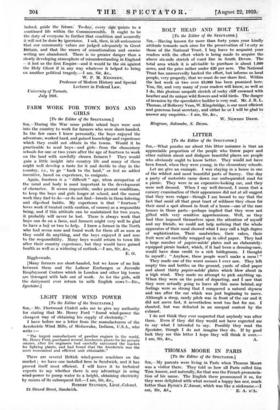FARM WORK FOR TOWN BOYS AND GIRLS
[To the Editor of the SPECTATOR.]
SiR,---During the War some public School boys were sent into the country to work for farmers who were short-handed. In the fevi cases I knew personally, the boys enjoyed the adventure, worked hard, and gained knowledge and experience which they could not obtain in the towns. Would it be practicable to send boys—and girls--from the elementary schools for one or two years after the age of fourteen to work on the land with carefully chosen farmers ? They would gain a little insight into country life and many of them might well develop a taste for it and decide to stay in the country, i.e., to go " back to the land," or feel an added incentive, based on experience, to emigrate.
Again, fourteen is a "difficult " age, when occupation of the mind and body is most important in the development of character. It seems impossible, under present conditions, to keep the boys and girls longer at school, and the casual work they find to do—or do not find—breeds in them loitering and slip-shod habits. My experience is that " fourteen " loves work if treated (with caution, of course) as a responsible being, and if this attitude can be maintained for two years, it probably will never be lost. There is always work that boys can do on a farm, and farmers might very well be glad to have a bok or two to help. I knew a farmer in the North who had seven sons and found work for them all as soon as they could do anything, and the boys enjoyed it and rose to the responsibility. Many boys would return to town life after their country experience, but they would have gained health as well as a widening of outlook.—I am, Sir, &c., [Many farmers are short-handed, but we know of no link between them and the Labour Exchanges or Juvenile Employment Centres which in London and other big towns are thronged with lads out of work. As for the girls, will the dairymaid ever return to milk English cows ?—En., Spectator.]


































 Previous page
Previous page